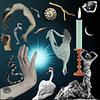Take a photo of a barcode or cover
1.64k reviews for:
David Y Goliat: Desvalidos, Inadaptados Y El Arte de Luchar Contra Gigantes / David and Goliath
Malcolm Gladwell
1.64k reviews for:
David Y Goliat: Desvalidos, Inadaptados Y El Arte de Luchar Contra Gigantes / David and Goliath
Malcolm Gladwell
challenging
informative
inspiring
fast-paced
This was a little more concise than other Gladwell's books but it was still very interesting. I love the various stories that he tells to illustrate his theories, I'm always engaged. The comparisons don't always make perfect sense; there were some here that I didn't agree with, but overall I can see his point and his goal is a good one: it's good for any of us to know that the underdog isn't always so much weaker than its opponent and that those that have the power can swiftly lose it, especially if they lose their legitimacy.
While this books didn’t hold me in its grip like Malcom Gladwell’s others, I did gain a few profound learnings from it. Mainly that sometimes it is important to become the big fish in the small pond instead of the opposite.
Malcolm Gladwell has become one of my favorite authors. In David and Goliath, he explains why a persons perceived disadvantage can actually be an advantage, and vice-versa. It's a fantastic read and one which has helped me to rethink my own self-perceived disadvantages.
Thoroughly enjoyable and thought provoking read. I am aware that there is some debate around Gladwell's use of stats but I really appreciated his insights and anecdotes. The section on choosing a College / University was probably worth the price of the book alone.
i know gladwell gets a lot of criticism but here is why i love every. single. one of his books - 1. he makes me think out of the box 2. he always entertains and keeps me engaged.
honestly i always listen to his books on audio and spend more time sitting in my driveway than with any other author. keep it up malcolm - you will always have a fan in me!
honestly i always listen to his books on audio and spend more time sitting in my driveway than with any other author. keep it up malcolm - you will always have a fan in me!
I'm trying to figure out why this one didn't move me as much as Gladwell's other books. Familiarity with his style? Expectations? I'm not sure.
I was thrilled with the tale of the basketball coach using the full court press to make his team a force against other teams who approached the game differently (and even it felt familiar), but otherwise I didn't feel much. There were points made that were interesting (changing the "rules", the power of the near-miss) and some stories worth considering, but nothing particularly electrifying.
I was thrilled with the tale of the basketball coach using the full court press to make his team a force against other teams who approached the game differently (and even it felt familiar), but otherwise I didn't feel much. There were points made that were interesting (changing the "rules", the power of the near-miss) and some stories worth considering, but nothing particularly electrifying.
I enjoyed every book by [a:Malcolm Gladwell|1439|Malcolm Gladwell|https://images.gr-assets.com/authors/1564001739p2/1439.jpg] and so I knew in advance that I will like it. The author stays true to his style of mixing personal stories, historical anecdotes, and scientific studies to deliver a powerful message that sometimes a perceived advantage can end up being a disadvantage, the most obvious choice is not always the best one, and that brutality cannot win in the long term. As my daughter approaches her senior year, I found the chapter on college choices especially relevant - it made me recognize that sometimes "the second best" choice might be actually better for a student, especially if they are not going to be in the "top third" of their class. Overall, it was a very worthy read.




